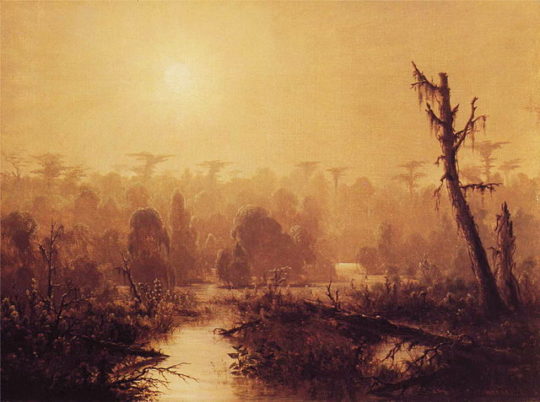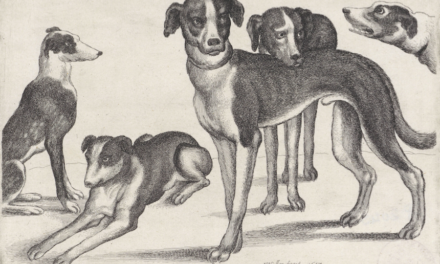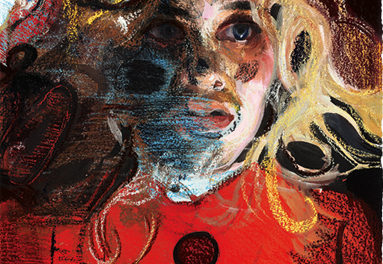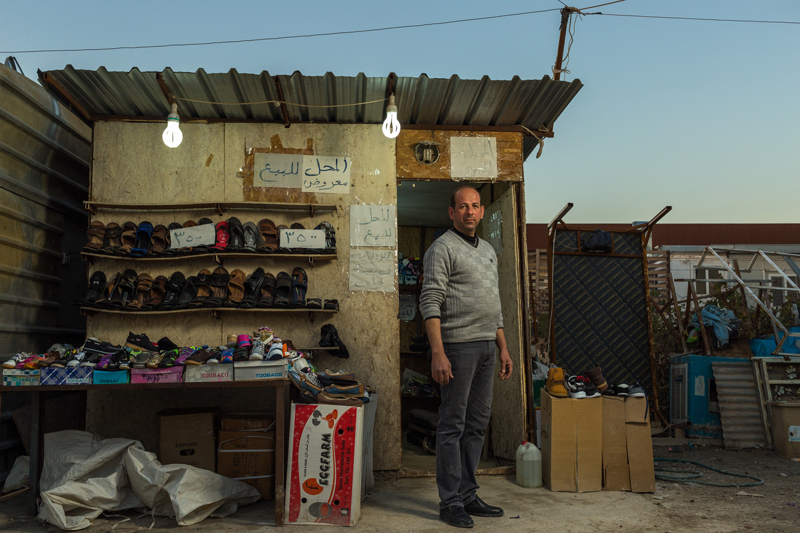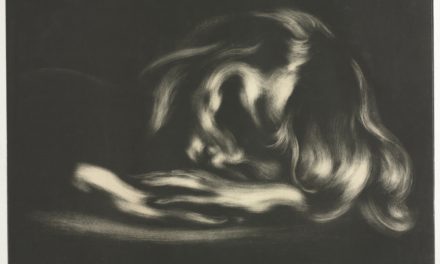Meeker Rustling, Joseph. Louisiana Bayou.1866, Roger Houston Ogden Collection, New Orleans
Along the Waterline
by Adam Gnuse
Georgette fired her rifle into the dark of the woods around her home, and she heard the woman scream and the rush of leaves as she collapsed in the underbrush. Georgette could see nothing outside the harsh yellow glow of her backyard floodlights, the space beyond the netted tomato and cantaloupe plants, the shed and the truck and chicken coop. But from her raised back porch, her ears were enough: hearing that old woman moan and pull at the rustling leaves of ivy around her, the nylon of her waders rubbing against themselves as she squirmed in the litterfall and mud. All at once the woman went quiet, and there was hardly any noise at all. Then the sound of boots breaking the surface of the water, and the lop-sided splash of the woman’s shins through the knee-deep swamp that swelled up just beyond the backyard tree line. Georgette had shot the woman through the leg. The calf, she realized. A thigh or trunk shot would have kept the woman from moving, and an arm would have hardly slowed her down. Georgette listened to her, out in a dark that rippled with the shadowed branches of cypress trees, until the thick sounds of water sloshing against the woman faded, and there was little else but the soft eddying of her wake.
Georgette stayed there a while, on the back porch, thinking of how strange the nighttime makes familiar things, how it skews distances, how just beyond the backyard tree line now might as well have been ten miles. Eventually she went back inside, turned on the news station. She watched her TV on mute for an hour, leaving the overhead and lamplights off. The national news stories of politics and budgets hardly applied to her, to south Louisiana. When a hurricane threatened to strike New Orleans, only then did the television stations send their reporters down to the levees for a day to be filmed in their ponchos, buffeted by the wind and rain, appearing alone in the frame with the waves of Lake Pontchartrain crashing behind them. But to Georgette, even New Orleans might as well be another country. There were no flood walls or levees where she lived.
Georgette didn’t call the police. When she crawled into bed, she leaned the .22 against its frame. She listened through her open window to the chorus of frogs and the sounds of night animals wading through the swamp water and moving through the underbrush. She considered each noise. The wind causing a branch to bump a window pane could sound just like boots crossing the raised porch. The hooting of an owl might be the injured woman’s moan. Even Georgette’s own legs shifting in her sheets could sound, for a moment, like another person, outside, crawling into a pile of leaves. At some point, Georgette’s eyes closed, and even when she gave in to sleep, she could still hear.
***
She was alone, retired early, and had been since Jimmy left her, moving north to Baton Rouge to pick up work in car repair. Her daughter, April, was a grown woman now, West Coast and educated, business attire even on the weekends. Sunday was their phone day, still a few days away. The next morning, Georgette rose with the sun, brewed black coffee, and let the cats out. There was still leftover andouille from last Saturday evening’s church potluck, and she heated it in a frying pan, the meat crackling as she sat at the kitchen table. She massaged her jaw and watched cardinals work at the bird feeder hung from the weather-worn shed in the early morning light outside.
There was a time when, after what happened last night, Georgette would have called her father, and told him to come over. As a young woman, she might have spent the morning inside, looking out through windows as her dad paced the length of her property, searching for the flash of a woman’s overalls moving between the trees. But her father had passed years before, even before Georgette had April.
She could still call Jimmy, even now, and she knew he would come, his truck pulling into the same spot of the yard where the grass never seemed to grow back. Jimmy might even spend the night, lying next to her in bed with his hands on his chest, listening with her to the nighttime outside the window, for the sounds of someone circling around the house. But she wouldn’t call him. A while back, she had decided she would be okay living here, being on her own. And that meant dealing with the things that frightened her, on her own.
After she had eaten, Georgette went out back, bringing a bowl of cold lettuce, coffee grounds, and the rest of her morning’s andouille to the chicken coop. She worked the combination lock open with one hand and let the hens out between her legs into the yard, where she scattered their breakfast. It was nice to see them: healthy, oblivious. They swarmed the food, their toes squeezing the soft earth, their sharp beaks tearing lettuce leaves and meat loose in swift, abrupt pulls.
“Scavengers,” Georgette thought and smiled. Watching them eat always made her feel she was looking at something prehistoric. Expressionless and greedy, nothing to show their hunger besides that they were eating. And eat they would-anything. Once she’d brought out scraps of fried chicken, and later when she had realized what she’d done, she saw they’d even picked the bones to splinters. But there was always something comforting to the way she could at least count on a couple of the hens, wide-eyed and warbling, to follow her throughout the yard during the day, warm and unfazed even when she’d pick one up and tuck it in the nook of her arm. She gathered the eggs from their roosts in the coop in a padded bucket, taking time to check the tears in the chicken wire, where other woman had come to cut the night before, before carrying the eggs back to the house. The sun was well up, and the woods around her were empty as far as she could see, when she put on her waders and went to gardening.
Here, after the last flood, the forest she’d known when she bought the property with Jimmy twenty-six years back had never drained. The standing brown water had choked off the live oaks and pines, rotting their roots and leaving them nothing more than husks to topple when the tropical winds came in the late summer. The trunks of other trees lay scattered between the cypresses, making crumbling black homes for snakes and spiders and roaches. The cypresses never fell, though. Cypress wood doesn’t rot in the water. They would stay until the salty Gulf waters wore their way through the coast, up past New Orleans. Georgette loved those trees.
It was a true swamp now, she had come to realize that, surrounding her hen-pecked lawn and raised vegetable beds. Swamp for three-quarters of a mile to her nearest neighbors, nice folks but not known too well, and swamp until the nearest town, Holden, forty-five minutes by the highway. It had always rained often here, three or four times a week even in the winter, but with the hurricanes, now so much stronger than they used to be, and the Gulf eating away the cypress swamp, each year the water grew higher.
And with the swamp waters came those things that go along with them, the gators and cottonmouths, and the fear that any heavy rain will swell the mud-brown water high, above the truck tires of her F-150, onto the back patio and into the house, where old cookbooks, pans and pots, floor tiles and waterlogged picture frames all would come rising up like a child’s toys in the tub. Of course, there were other reasons he left, but Jimmy had said he couldn’t cope with another flood. Coming home and pushing the back door open against the weight of the water pressure to see the flood in the house, the cats who made it pawing atop bookcases, the dog who didn’t half-submerged and lifeless across the couch.
And, of course, with those waters come the old swamp stories Georgette’s Maman used to tell her. The fil-a-follet, the lights above the water at night; the rougarou, the furred man, with red eyes that could drive someone mad enough to eat others’ flesh, and her own. And then, there were the stories of the people out in the swamp-but it was clear that they weren’t just myth anymore. That was clear. Georgette chuckled to herself, felt a swell of nausea rise in her gut.
Now, with all the homes lost to the flooding and erosion down south, with refugees washed ashore into the bayous and escaped prisoners from Angola when the hurricanes flooded the basement cells. Now, they were real, the people out after dusk in their long, hanging hats and old, worn waders, catching catfish using nothing but their fingers for bait, making gray beds of Spanish moss in the trees at night. They were men and women that would come into yards at night, and press their faces against the windows.
Women, like the one last night, the one Georgette had found in her yard by the chickens. The one who, in that moment, had made Georgette feel unhinged at her home, who had made her feel that a house and a property, that tools and equipment in the shed, and books, and pictures, and clothes-even the ones she wore-were not things a person owned. These were things a person fought to keep.
Georgette watered the tomatoes in one raised bed from the hose, and she worked on hands and knees in another, digging a new row for green beans she hoped would finish up before the fall. The dirt was loose and black, healthy with decayed matter so that trips into town for fertilizer were rare. She circled through the yard, checking for traces of armadillos’ diggings, or for the deep plowing that boar do for their grub, and went to the shed to cut weedkiller with water in the two-gallon sprayer. She traced the perimeter of her yard, where the poison ivy grew fast and thick in the shade, misting each mitten-shaped leaf with the nozzle in turn. When she was nearly done, she saw that one of the cats had gotten itself caught in the fig tree again. The orange tabby meowled for help on one of the upper branches as it somehow continued to work itself even higher, smushing its fat white belly against the branch, so it plumped over each side.
“Hot shit, Mr. Puss,” Georgette said, but she wasn’t unhappy with the extra chore, the extra excuse to work and not think about things. She went back to the shed to grab the old wooden oar, a relic from the fishing boat her Daddy built himself and left for her. She lugged it over to the fig and thrust the gray length of it in the air like a flagpole. Either the cat would latch on, or it would fall like it had before. Falling wasn’t that bad considering-the tree wasn’t all that tall, and the ground was soft and wet enough so even his more graceless of landings left him little more than pissed. What was worse was to leave him up there, with branch bending under his weight, meowing and stranded. There were hawks out here.
She prodded the cat with the oar twice, and this time, it chose the gentler option. The cat latched onto the oar, one forepaw then the other, and she lowered him slowly to the ground. Once the cat was down, it turned and lumbered away to the home it had made beneath the house.
“You’re welcome, you little turd,” Georgette said. As the cat left, its tail flicked as though it were shooing off a fly, and Georgette grinned and flipped the cat the bird. She finished spraying the ivy with chickens warbling around her legs, and the sun glowing bright between the clouds. It was a good day, considering. It could be hard to think, sometimes, that daytime and the night that came before really existed in the same place, that they weren’t on two separate worlds.
After she dropped off the weed killer in the shed, Georgette pulled off her gloves and surveyed the yard, her focus expanding to each edge of her property line, which ended where the line of dense cypress forest began. Between the chickens’ picking and the recent heavy rains, the lawn looked like it needed help. The shed needed work, as well. She’d have to replace it after all, now that the paint below the brown-gray waterline of the last flood had begun to flake off. It meant rot, and that was contractor’s work. Georgette dreaded the thought. The costs of having them come out were tough, and her savings and the retirement package from the chemical plant could only afford to rebuild so many times.
She’d make the call tomorrow, maybe, or the day after. There wasn’t a rush, considering how last time they had parked their trucks in the yard, nearly on the peppers, and had left deep rivets in the grass from where their tires sunk in the earth. The tire tracks had finally since filled in, and she wanted to hold off as long as she could without again hearing the whir of the contractor’s truck tires spinning in the mud of her yard. In the meantime, it was nice looking out over her property and not seeing someone else’s mess.
Someone else’s mess.
God, Georgette thought, how nice it would be to forget something well enough that you wouldn’t even know you weren’t thinking of it.
The thought of a stranger in her yard, in her house. Last night, all it took was one woman stepping past the tree line of the woods and into her life.
Georgette couldn’t help but think of those church stories and nighttime news reports she had heard over the years, from people not that different from herself. Stories of the others who came home from hurricane evacuation to find those men and women who lived out in the swamp having broken into their houses, still there. Homeowners who would push open their front doors to find that they’d been replaced: dishes in the sink, blankets still warm on the couch, the sound of water running in the bathroom.
Until last night, Georgette had never seen them herself, never known them to come to her property and home, besides once, years back when April was still a teenager, and Jimmy was still around. Georgette had gone out to pick up April from evening Youth Group at the church and had come to find all the lights of the house gleaming through the windows of her home. Inside, Jimmy was red-faced, hunched over at the kitchen sink. His white shirt was streaked with mud, and he was taping gauze to the seeping wounds on his forearms and neck.
Jimmy said he had been checking the armadillo traps in the woods and had come back to find the man crawling up on the trashcan outside the house to get a better look into the kitchen. The man was big, as big as Jimmy, and he had one of those small, curved knives for filleting fish. Even so, Jimmy had come at him, barrelling from the dark around the house. He had fallen on him, and they had struggled in the mud by the porch. Eventually, Jimmy was able to free the lid from the trashcan and wedge it into the man’s mouth from on top of him and push, through the lips, hard enough to hear the teeth crack.
Georgette hadn’t known of any others like him. Not until the woman she had shot.
The leaves rustled around her, and for a moment, Georgette’s heart was in her throat. But it was only the breeze, and it blew cool on the sweat on the back of her neck. Georgette sighed, and after a few breaths, she realized she was counting on her fingers. A pair of gnats flitted about her vision, and she started over.
One, she thought, mouthing the number with its own slow breath.
Two.
Three.
It was four days until Sunday. Four nights. And then that’s when her daughter would find time to call her. The sound of April’s voice, of her fussing over co-workers, and bureaucracy, and politics-it could always be enough to help. Georgette wanted the call earlier, to go inside and dial her daughter up right this moment, but April was always short with her mother during the week, distracted, so that Georgette could sometimes hear the sound of April’s computer keys clicking through the receiver as she spoke. That was the last thing she wanted to hear now.
Besides, even though April had grown into a woman, she was still young.
She lived too far away now to understand.
Maybe Georgette might go ahead and ring up Jimmy, after all. It had been a while since they had spoken through anything but email. And there was another church event to look forward to, a bonfire this Friday. Though even Friday seemed like a very long way off yet, it would be nice, even if Georgette found she had nothing to say. Just dressing her hotdog in the faint firelight and sitting in one of the reclining lawn chairs near the others. Watching the embers rise into the night air. Listening as they talked about their hunting trips, and God.
Georgette took a deep breath, lowered her head, and shook it. She walked over to the chicken coop, and again she studied the tears in the wire. She knew there was no forgetting anything when that had to be fixed. Even tonight, a coyote or fox could find even the small foible in the coop, wrench its body through. She had seen it before: how they eat only one or two of the chickens and leave the rest a mess of bloody feathers. Georgette pulled at the wires. All things considered, it was good, she guessed, that the holes in the wire were localized, that it was another person with a tool who had cut it, instead of some animal with its teeth. It would be a quick fix this way. Georgette grabbed her work gloves from the back porch and took to twisting the cut wires back together.
As Georgette worked, she ignored the footprints of the other woman’s beneath hers. She squelched her boots in the mud as she crouched, erasing the prints with her own. Soon her fingers began to ache even with the gloves, stinging as though they might soon bleed, but she pressed on until the work was done. When it was finished, the broken wire mottled but repaired well enough, Georgette stood and felt the sun on her face and the cling of the shirt to the sweat on her lower back. She opened her eyes to see a pair of egrets out in the swamp, white as ghosts, each balancing on one foot in the water. They stood side by side, like sisters, dipping their long beaks in turn beneath the surface.
As much as she wanted to forget it—everything about the night before—as much as she wanted to go on with this day as though it were any other before, she couldn’t. She wouldn’t forget. Already, it was a memory that would linger in this place, her home, as long as she was here to keep it. Now, Georgette knew each time she looked out over her yard, she would think of that woman, where she had stood, the plants and tools she had wanted and had touched, where her feet had fallen, where she would be now if Georgette had allowed her to stay.
Georgette knew she would always wonder each day where that woman was. Was she just there, beyond the tree line, sprawled and pale, bled-out from the wound? Was it only a matter of time until the next flood, when the brown waters would rise and carry her back, her arms stretched wide, floating steadily between the trees, back to Georgette’s home?
Or was she still alive? And was she thinking of Georgette, as well?
The night before, as she sliced tomatoes for her dinner, Georgette had been drawn outside by a strange sound coming loud from the chickens outside-a shush, like the dragging of a tarp over grass, or of schoolchildren trying to quiet one another. It was after nine in the evening, dark even in the late summer, with the calls of tree frogs ringing out. For a short while, Georgette stood still in the light of her back porch. Eventually she slipped her boots on, and stepped off, moving slow, aware of the squelching of the mud in her knee-highs, the gray outline of the chicken coop, and how the darkness was making strange shapes of the knots in the cypress trees around it. She brought a fluorescent lantern with her, but it wasn’t until she was near the coop, hearing the sounds of thin metal snapping, that she circled around its back and turned the pale light on.
The woman was on her knees, pink long-sleeved shirt tucked into a pair of muddy waders. Her short, grayed hair was frizzed and dirty, and with her bare hand, she had wedged a pair of cutters into the chicken wire. As she looked into the light, the woman grimaced with brown teeth.
“Oh,” said Georgette. “Oh, God.”
The woman pulled herself up to full height, which wasn’t much, small as Georgette. She tucked the wire cutters into her front chest pocket. Georgette took a step back, and the lantern light cast upon the woman bobbed. The woman took a step back herself, half into the dark, but Georgette could still see her cheeks pulled wide, grinning grotesquely. She shrugged and rubbed her stomach as if to say,
“Hungry. Just that.”
The woman turned and walked away around the chicken coop, and Georgette circled around the opposite side, taking one backward step after another toward the glow of her porch lights. The tree line to the north was closest, but instead, the woman cut across the long length of Georgette’s lawn, looking straight at the shed, then at the house, her lips still wearing the faint turn of a smile.
She lingered by the rows of tomatoes, as if it were own yard to care for. She stopped, bent, squatted, and slipped her fingers between the bird-netting to touch the plants’ leaves, as if to feel for moisture and health. Georgette climbed the steps of the back porch, and she watched the woman take the footworn path to the wheelbarrow, where she reached in and scooped out a handful of dried leaves. The woman moved the palm of her hand along the wood of the handle, and she turned back towards Georgette with a look as if she were seeing someone else.
Georgette went inside to the kitchen and pulled the gun case free from beneath the towels her cats used as a bed. Her hands were shaking as she placed the small golden shell into the bolt action and locked it. She looked out the window and saw the darkened reflection of a fear-gaunt face imposed upon the glass, and felt her pulse beat in her temples and wrists. She thought of her Daddy’s old words in her ears, listing to her where the kill shots were for deer and pigs-you shoot them in the jaw, the spine, or heart.
The woman must have seen Georgette load her rifle through the illuminated window because she began to run in her waders, awkward as a bird, through the yard for the tree line. Georgette stepped out on her porch and placed the barrel of the rifle on the banister, expecting that any second the woman would turn and duck for cover behind the raised vegetable beds, that somehow she would pull a set of keys from her deep pockets and lock herself in Georgette’s shed or the truck.
But of course she didn’t, and once the woman was outside the glow of the porch lights, her shape blended with the dark trees, and there was nothing but the loud sounds of her boots stomping through the underbrush. Georgette raised her rifle, aimed, and fired on faith. The recoil was gentle, the rifle’s crack a shock to her ear.
A scream, quiet, and moaning. And quiet again.
Later, there were the sounds of a body stepping into the water, with one slow stride then the other, hurting, working its way through the knee-deep swamp. The sound of water against the trees. The frogs of the swamp silent. The buzzing of a mosquito in her ear.
It was hard to tell the moment when the woman was really gone. The splash of a catfish tail as it broke the surface in the dark, or the sloughing of rotted branches from their trees could sound like a woman’s boot slipping into the water from atop a cypress knee. In the dark beyond the porch lights, the noises might as well come from miles off. The yard beyond the porch wasn’t hers anymore, didn’t belong to her-zoning and property lines meant nothing then-and Georgette found herself wondering, for a brief moment, whether the woman had ever had a husband, or a child.
Georgette had slept that night with her storm windows open to the sound of swamp water lapping against the trees. And she would the next night as well. The long gravel path from Georgette’s yard to the road had rainwater in its deep potholes which never seemed to drain. With the way the water rose each year, it wasn’t hard to imagine when those sounds would come from every direction.
At night, Georgette will sleep with her blankets kicked down around her feet, with the breeze bowing the loose window screen. She’ll listen to the calls of frogs and the rustling of night animals pulling themselves up from the water into the underbrush. She’ll think of the homes she used to pass when driving to town along the highway, brown slanted things, cabins, sheet metal roofs, and how one day she drove by to find them broken, or gutted to their frames, or gone, somewhere in the lake.
She’ll think of the faces she had seen on their porches, black and white ones, blurred as old coins as she sped along in her truck in the passing lane. She’ll listen closely, and she’ll still hear, far as they are, the highway cars from her bed, even beneath the cold breath of wind through the cypress trees, and the first drops of rain upon her home’s wet earth.
Adam Gnuse is a New Orleans native, currently attaining his MFA in fiction at UNC Wilmington. His writing has appeared in Bodega, Guernica, New South, The Wisconsin Review, and other magazines. He’s happy to be reached at adamgnuse.com

